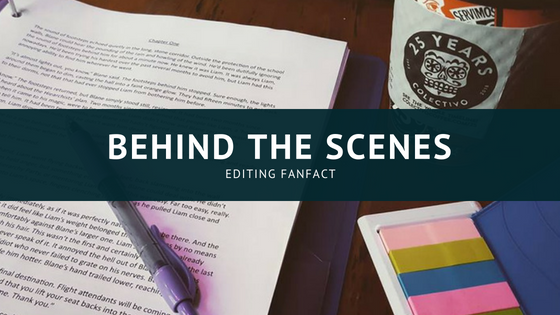You may be surprised to learn that there are many ways you can turn fandom into a business.
You can become an etsy seller, a professional cosplayer, or even an academic who studies fandom (my friend is going for a PhD in it). But many of us fans dream of doing more than discussing and promoting our favorite works… we want to create our own.
This may be because we have our own stories clawing at us from deep inside, or may just be because we are tired of queerbaiting. Either way, a lot of passionate fans are also passionate creators, no matter what the medium may be.
But how do you make the jump? And how did I not only make the jump, but make the jump with a story about fandom?
It Started With Fanfiction
I started writing fanfiction back in 2003, and I never did stop. I started with (really bad) Harry Potter fanfiction about the Marauders. It included self-inserts. I was only twelve, don’t judge me.
Death Note fanfiction is where I really hit my stride, and it’s the period when I realized I really wanted to be an author. I loved writing. I was constantly having new ideas, especially for AU stories about Mello and Matt. I even became a bit of a household name in the Death Note fandom (I’m still proud of that). By the time I was heading off to college, I’d written hundreds of thousands of words and was planning to major in creative writing.
Being a Creative Writing Major
I did get some scorn for majoring in English with a focus on creative writing. I knew I wanted to be an author, but I wasn’t sure exactly what I’d do with my career beyond that. I imagined I would work in the publishing field in some capacity, and my editing and publishing class only made me that much more certain.
At first I struggled to write content that wasn’t focused on characters that already existed. It was difficult to pull myself away from the typical fanfiction tropes. While many of them make for great stories, a lot of them don’t make for great novels. This was probably my biggest struggle when it came to my English courses. In a way, writing my original work just seemed boring to me.
I also faced a lot of stress about my future career. I’d chosen English knowing it made me more marketable than other degree options, but I still felt rather limited in what careers I could actually pursue. So, naturally, I just focused on my writing classes.
And I did get better. I was always reading, for fun and for classes. My final exams were writing short stories or essays about literature. I got used to critiquing people’s work. I took English courses in satire, utopia, literary fiction, experimental fiction, and folklore. By the end of my college career, I had a better understanding of myself as a writer.
Writing Novels That Sucked
My first 3 novels, 2 of which I never properly finished, were terrible.
The first two were actually just complete garbage. The third tried, but really did not go very well.
Here’s a small list of the problems these three novels had that made them garbage:
On the bright side, I learned a lot from those three failed projects. They helped me learn to improve those things, and they helped me figure out how to craft characters I loved so much that I never wanted to leave their world.
Seeking Utopia
This is a novel I don’t discuss here often, but it is the first novel I completed that I felt had a shot at publication. Seeking Utopia is the first in a trilogy about a girl who travels between dimensions using cracks she finds in the world.
Okay I know this sounds similar to FanFact, but they’re actually really different. Seeking Utopia is based on science and physics. It features about a dozen different dimensions, all very different, and has a very different feel. It’s a book series that features a bunch of strong queer women with a man or two thrown in here and there.
I do plan to go back to this series. The first book is finished, and the second in the trilogy is in progress. Once I finish FanFact I’d like to go back to it and start edits.
FanFact
FanFact is my baby. The idea grabbed me about a year ago and has consumed my life. I fell in love with the characters and the world before I even began to write it, and I think that shows in the novel.
In fact it’s one of the first things I ever wrote about on this blog!
This novel really brought me back to my roots. It’s a novel about being a fangirl, about slash pairings, and about magic. It’s a novel that even features fanfiction, but moves beyond that to flesh out new original characters, but from a fangirl’s perspective. It is exactly the novel I want to write.
It’s been a long road to get here from being a fanfiction consumer, but it’s been an amazing ride. You don’t have to be an amazing cosplayer or artist to have a career in fandom life. You can create your own fandom, using your own original ideas.
Get out there. Make something amazing, and find amazing people to share it with!
FanFact Freebies
Sign Up For My Newsletter (Bonus FanFact freebies)


